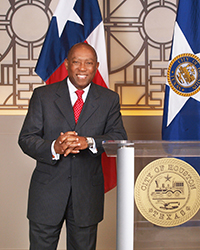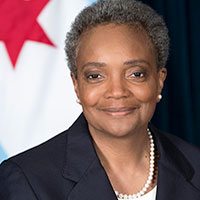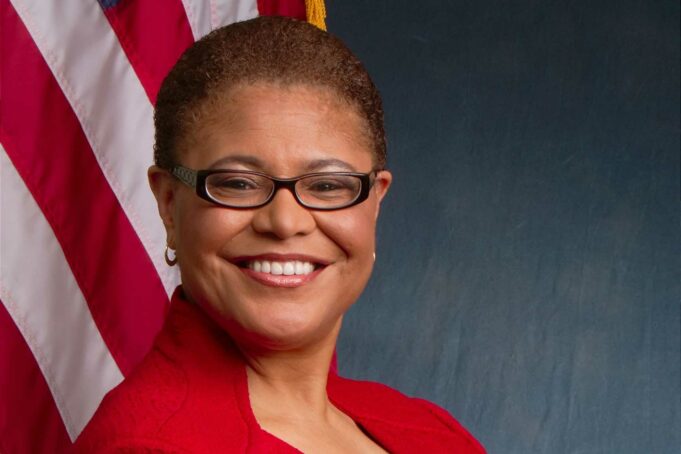On the federal level, the dust has mostly settled from the 2022 midterms and the Democrats have retained their thin control over the U.S. Senate, while Republicans gained a slim majority in the House of Representatives, reflecting an American electorate divided by frustration over inflation, crime, changing social narratives, and immigration policy to name a few.
On local levels, the November 8 elections, made Karen Bass the first female mayor of Los Angeles, which now means the country’s four largest cities will be led by Black officeholders in a time of national discord. Mayor-elect Bass joins Mayor Eric Adams in New York, Mayor Sylvester Turner in Houston and Mayor Lori Lightfoot in Chicago as the top political leaders of America’s four most populous cities. And while observers may revel in this historic achievement, the challenges these mayors are facing in their cities are challenging.
The African American Mayors Association released a statement Nov. 18 noting the achievement. “While we are proud of these accomplishments, we know there is much work to be done in our cities. AAMA stands to support and empower these local leaders to strengthen their communities and address the pressing needs of their citizens,” the statement read in part. The association represents over 500 Black mayors across the United States.

“Los Angeles can be a city where all people have access to quality health care,” the vision statement for Ms. Bass’ mayoral campaign said in part. “Los Angeles can be a city where its economy—one of the most robust, intricate, and complex economies in the world—can work for everyone. Los Angeles can be a city where everyone can afford housing, where everyone can be paid livable wages, and where services and resources are provided to help get folks who may have stumbled, back on their feet,” her campaign website read.
Adding that public health and public safety are major concerns in America’s second-largest city, the Bass campaign asserted that the economic crisis of homelessness has evolved into a full-blown humanitarian emergency, requiring a concerted effort through declaring what she called a “Homeless Emergency.”
“It is absolutely not a soundbite, it is not a solution in and of itself, but it is to help us get a solution, and that solution is getting people off the streets and into housing,” Mayor-elect Bass insisted during an interview on Fox 11 Los Angeles, on Nov. 23. “Essentially, it will give me the authority to rally all of the different departments in the city so that we can centralize the process and move it forward, and especially to take control over city-owned land and fast-track housing.”
Although major U.S. cities face complex challenges requiring the prudent use of resources, New York City, with a population of nearly 8.5 million people, is unique not only because it is America’s largest city, but also because of the continuous need to address the demands of multiple constituencies and their varied interests.

On Nov. 21 alone, aside from the day-to-day requirements of leading a significant municipal entity, New York City Mayor Eric Adams issued four Emergency Executive Orders covering a range of issues including:
- Providing immediate shelter to a massive influx of asylum seekers from the Southern border that will exceed 100,000 individuals next year if it continues at the current rate.
—Emergency Executive Order 266.
- Extending the city’s state of emergency, regarding the threat and impact of COVID-19 in the City of New York, directing the Fire and Police Departments, the Department of Buildings, the Sheriff, and other agencies to enforce lawful directives previously given.
—Emergency Executive Order 267.
- Extending the state of emergency related to public safety from the damage done by flash floods caused by the remnants of Hurricane Ida that affected roads, mass transit, stranded motorists, and widespread damage to residential and commercial buildings throughout the city.
—Emergency Executive Order 268.
- Taking immediate steps related to the Nunez use-of-force class action to address conditions in New York City jails including staffing issues, maintenance, and delivery of sanitary conditions; access to basic services including showers, meals, visitation, religious services, commissary, and recreation; and prompt processing at intake.
—Emergency Executive Order 269.
In the case of America’s third largest city, issues facing Chicago’s Mayor Lori Lightfoot include the legacy of racist housing discrimination, the displacement of long-established neighborhoods through gentrification, and intentional policies that developed and maintained a racial wealth gap that for decades have hindered the economic development of Black neighborhoods. The mayor is running for re-election with the race slated for February 2023.

According to WGN-TV News 9, Mayor Lightfoot announced Oct. 18 her plan to invest $2 billion over the next two years of her Chicago Works infrastructure plan—implemented to repair city bridges, roadways, traffic lights, bike lanes, and other projects. Additional spending will include the purchase of 530 police vehicles, 80 fire department vehicles, and funding for facility renovations.
“This proposal will provide the city $1.8 billion in bond funding, to continue the investment level needed to truly transform Chicago for the better, over the course of the next two years, but with projects that will benefit our city for decades to come,” Mayor Lightfoot said during a press conference on the Chicago Riverwalk. “While it’s clear we accomplished a lot in the last two years, under the Chicago Works program, we know that the hard work isn’t done yet.”
According to the 2020 U.S. Census and its July 2021 projections, Houston, Texas, is America’s fourth largest city, and Mayor Sylvester Turner leads a municipality that is nearly 45 percent Hispanic/Latino, 24 percent non-Hispanic White, and just under 23 percent Black, implying greater competition for city resources as it faces gentrification and higher costs of living in a city of nearly 2.3 million people.
Upon entering office in 2016, Mayor Turner said that roughly 38 percent of Houston’s 5,200 police officers were eligible to retire, and since his first term, his city has hired 1,991 more officers, leading to a younger and more robust force.
“We inherited a very aging police force and to increase the number of police officers, being hired, even more, starting this month, the incoming pay for cadets will increase by $10,000,” Mayor Turner said, on November 2, during the opening of his 2022 State of the City Address. “Instead of making $42,000, they’ll be making $52,000. In January of this year, crime/homicides were heading in the wrong direction, it was about 65 percent above last year. In February of this year, we put in place “One Safe Houston,” it’s a $53 million program all funded by federal dollars,” he said.
The tumultuous politics of the last 25 years, including the 2022 midterm election season, has highlighted more than just political divisions within an equally divided country. It has also revealed that Black Americans are qualified to govern, 157 years up from chattel enslavement.
In response to the question: “Do we have the qualified men and women for self-government?” as written on page 225 of the Most Honorable Elijah Muhammad’s 1965 book, “Message to the Blackman in America,” Mr. Muhammad answered in the affirmative. “The answer to the above question is YES!” He proclaimed.
In a 2016 message from Atlanta, marking the 21st anniversary of the historic Million Man March, the Honorable Minister Louis Farrakhan expanded on what Mr. Muhammad wrote in the same chapter of “Message to the Blackman in America.”
“So there is something that we have to prove: That we can govern ourselves,” the Minister stated. “Look at what the Honorable Elijah Muhammad writes in “Message To The Blackman” on page 226 in ‘Do We Have The Qualified Men And Women For Self-Government?’: ‘We have enough technicians, such as mathematicians, construction engineers, civil engineers, mechanical engineers, electrical engineers, physicists, chemists, educators, agriculturists, navigators and aeronauts, among the [now 50 million] of us. You will find scholars or scientists whom we can use in every branch of government; then there are our own independent people outside of this country who would be glad to help us get going in a country or state for ourselves,’” Minister Farrakhan quoted from his teacher.
He continued, “We do not expect to build, nor do we desire to build a government patterned after the order of the White race. Naturally we would need help for the next 20 or 25 years. After that, we would be self-supporting! The spirit of ‘doing for self’ is now fast coming into our people. They only need a new education of self and others.”













